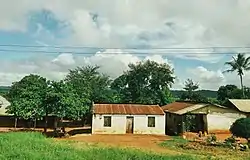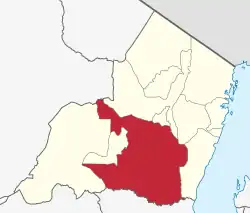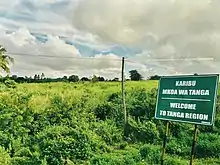Handeni
| |
|---|---|
| Wilaya ya Handeni, Mkoa wa Tanga | |
 Manga Village, Mkata Ward, Handeni District | |
 Handeni District in Tanga 2022 | |
| Coordinates: 5°30′32.76″S 38°20′20.04″E / 5.5091000°S 38.3389000°E | |
| Country | |
| Region | Tanga Region |
| Capital | Mkata |
| Area | |
| • Total | 6,534 km2 (2,523 sq mi) |
| • Rank | 1/11 |
| Population (2012) | |
| • Total | 276,646 |
| • Density | 42/km2 (110/sq mi) |
| Demonym | Handenian |
| Ethnic groups | |
| • Settler | Swahili |
| • Native | Zigua |
| Website | www |

Handeni District is one of the 11 districts of Tanga Region in Tanzania. The District covers an area of 6,534 km2 (2,523 sq mi).[1] It is bordered to the west by the Kilindi District and the Handeni Urban District, to the north by the Korogwe District, to the east by the Pangani District, and to the south by the Pwani Region. In 2002 Kilindi District was formed out of the district. The administrative capital of the district is Mkata town. According to the 2002 Tanzania National Census, the population of the Handeni District was 248,633.[2] According to the 2012 census, the population had increased to: 276,646.[3]
Administrative subdivisions
As of 2012, Handeni District Council was administratively divided into 20 wards.[3]
Wards
- Kabuku
- Kabuku Ndani
- Kang'ata
- Pongwe Pogwe
- Kiva
- Komkonga
- Kwachaga
- Kwaluguru
- Kwamatuku
- Kwamgwe
- Kwamkonje
- Kwamsisi
- Kwasunga
- Kwedizinga
- Mazingara
- Mgambo
- Misima
- Mkata
- Ndolwa
- Segera
- Sindeni
In pop culture
The dramatic open area to the north of Handeni was the setting for Ernest Hemingway's classic hunting book, Green Hills of Africa.
References
- ↑ "Tanzania: Northern Zone(Districts and Wards) - Population Statistics, Charts and Map".
- ↑ "Archived copy". Archived from the original on 9 August 2007. Retrieved 18 September 2007.
{{cite web}}: CS1 maint: archived copy as title (link) - 1 2 "2012 Population and Housing Census" (PDF). Development Partners Group Tanzania. Retrieved 7 August 2019.